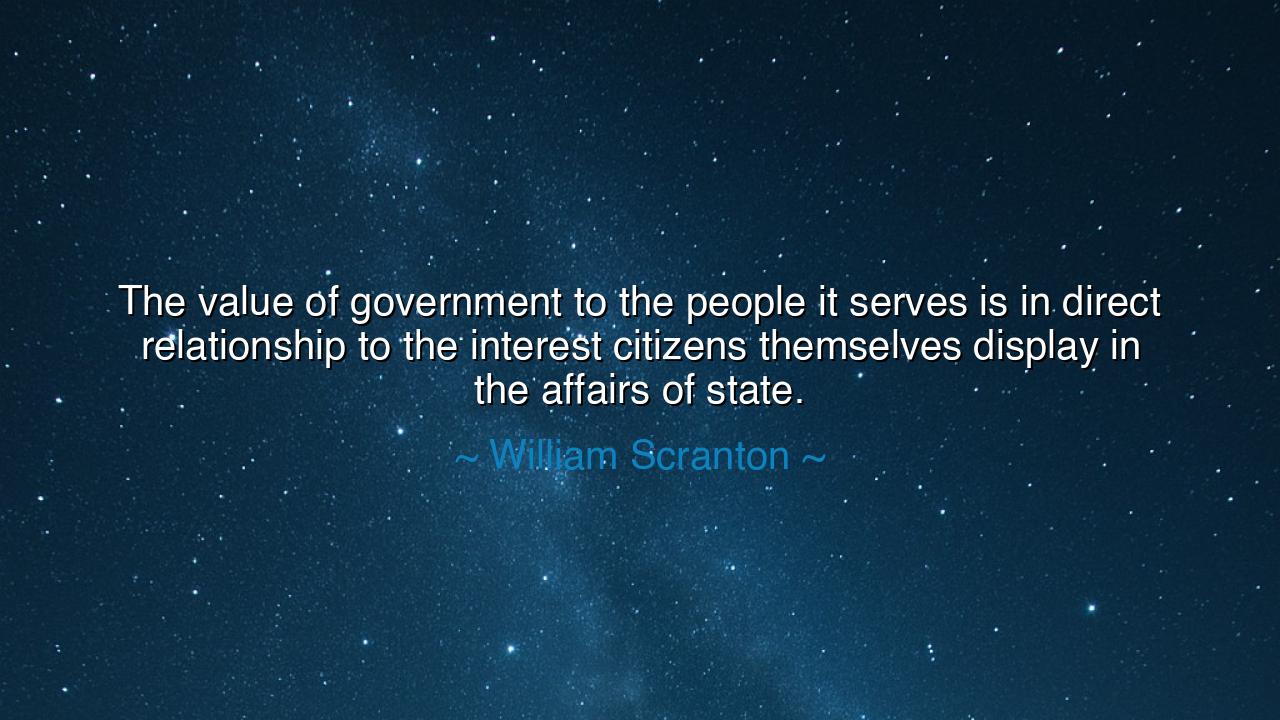
The value of government to the people it serves is in direct
The value of government to the people it serves is in direct relationship to the interest citizens themselves display in the affairs of state.






In the wise words of William Scranton, “The value of government to the people it serves is in direct relationship to the interest citizens themselves display in the affairs of state,” we are reminded of a timeless truth: that rulers and the ruled are bound together in a sacred covenant. A government is not a power that exists on its own, but a reflection of the will, vigilance, and participation of its citizens. When the people are engaged and attentive, their leaders are compelled to act with honor and diligence. But when the citizens grow apathetic, corruption and decay creep in like shadows at dusk.
The origin of this teaching lies deep in the foundations of civilization. In the ancient democracies of Athens, the strength of the state rested not on a single ruler, but on the collective voice of its citizens. Likewise, in the councils of elders and assemblies of tribes, the welfare of the community depended on the active interest of every member. The philosophers and sages of old warned that freedom is not a gift to be passively received but a burden to be actively carried. Scranton’s words echo these ancient voices, reminding modern peoples that they too must guard the flame of liberty.
To show interest in the affairs of state is more than casting a vote or voicing a complaint; it is a way of life. It means striving to understand the forces that shape one’s nation, questioning leaders with wisdom, and taking responsibility for the common good. When citizens live with this spirit, the government grows strong, just as a tree flourishes when its roots are tended. Without this care, the tree withers, and the fruits of justice and prosperity disappear.
Thus, Scranton’s words are a call to vigilance and unity. Let every generation remember: the value of their government depends not only on the virtue of rulers but on the engagement of the people themselves. A free and thriving nation is not built by the few, but by the many, who through their shared interest and sacrifice breathe life into the very heart of the state. In this mutual relationship, the destiny of a people is forged.






VAVan Anh
William Scranton’s words remind me of the critical role citizens play in a functioning democracy. If the people remain passive, the government cannot be as responsive or effective. But how do we encourage meaningful participation, especially in an age where trust in government can be low? Is it enough to simply encourage voting, or should we be looking for deeper, more consistent forms of engagement from citizens?
MXNgo Thi Mai Xuan
This quote by William Scranton brings up an interesting point—how much does our level of involvement actually impact the quality of governance? Does a more engaged citizenry automatically lead to better policies, or is there a risk of over-politicizing every issue? How do we create a society where people are both well-informed and motivated to contribute without creating divisions or gridlock?
TDNguyen Thuy Duong
Scranton’s perspective makes me think about how much we rely on government while often failing to engage with its workings. If the value of government truly depends on citizen involvement, how do we encourage more people to get involved? Is the problem apathy, or is it the overwhelming nature of political systems that makes it difficult for the average person to feel their participation matters?
PVNguyen Hoang Phuong Vu
William Scranton’s quote makes a compelling point about the relationship between government and its citizens. If people are disengaged or uninterested in politics, how can we expect our government to serve us effectively? But does this mean that the responsibility for good governance lies solely with citizens, or should governments also foster an environment that encourages public involvement? How do we strike the right balance between active participation and the practical challenges of civic engagement?